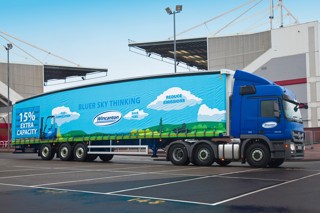The Government is introducing new legislation today (Wednesday, May 10) to allow longer lorries on British roads from May 31.
Operators will be able to use longer semi-trailer (LST) combinations up to 18.55 metres – 2.05 metres longer than standard size.
The extra length will enable them to move the same volume of goods using 8% fewer journeys than current trailers – generating an expected £1.4 billion in economic benefits and taking one standard-size trailer off the road for every 12 trips.
The move follows an 11-year trial to ensure they are used safely on roads.
It showed that LSTs were involved in around 61% fewer personal injury collisions than conventional lorries.
For Greggs, the change in law will help it achieve a 15% uptick in its regular deliveries having been operating LSTs from its national distribution centre in Newcastle since 2013.
“We were early adopters of the trial as we saw a significant efficiency benefits from the additional 15% capacity that they afforded us,” explained Gavin Kirk, supply chain director at Greggs.
“We have converted 20% of our trailer fleet to LSTs, which was the maximum allowable under the trial, and these complement our fleet of double-deck trailers.
“Our drivers undertook additional training to use these trailers and we have monitored accidents, finding that they are as safe as our standard fleet.
“Due to the increased capacity, we have reduced our annual km travelled by 540,000, and saved 410 tonnes of carbon per year from LSTs, which supports our wider ESG agenda, The Greggs Pledge.”
Roads minister Richard Holden says that a “strong, resilient supply chain” is key to the Government’s efforts to grow the economy.
“That’s why we’re introducing longer semi-trailers to carry more goods in fewer journeys and ensure our shops, supermarkets and hospitals are always well stocked,” he said.
“These new vehicles will provide an almost £1.4bn boost to the haulage industry, reduce congestion, lower emissions and enhance the safety of UK roads.”
Vehicles which use LSTs will be subject to the same 44 tonne weight limit as those using standard trailers, and the new vehicles are expected to cause less wear on the roads than conventional lorries due to the type of steering axle used.
Operators will be legally required to ensure appropriate route plans and risk assessments are made to take the unique specifications of LSTs into account.
In addition to these new legal requirements, operators will also be expected to put in place extra safety checks including driver training and scheduling, record keeping, training for transport managers and key staff, and loading of LSTs.
With more than 300 companies in the UK having already taken part in the trial, and almost 3,000 on the road, some of the biggest brands including Greggs, Morrisons, Stobart, Royal Mail, and Argos, will be rolling out the longer semi-trailers.
The trial revealed the important environmental benefits associated with the introduction of LSTs, included a reduction of 70,000 tonnes of CO2 and 97 tonnes of NOx over the trial.
The average CO2 reduction across the lifetime of the trial is similar to the amount of CO2 captured by roughly 11,600 acres of forest per year.
The savings in NOx emissions averages to the entire annual NOx emissions of around 2,000 diesel cars per year.
Introducing LSTs, says the Department for Transport (DfT), is an important, easy and affordable measure to continue to reduce CO2 emissions from the haulage industry without significant technological and infrastructure development.
Chris Yarsley, senior policy manager at Logistics UK, agreed. He said: “The introduction of longer semi-trailers into general service will increase the scope and scale of the goods which our industry is able to transport, increasing efficiencies and reducing the environmental impact of delivering for the UK’s economy.
“Over the past few years of the trial, our members have proved that LSTs provide operators with a cost-efficient, environmentally prudent alternative to conventional vehicles and our members remain committed to rolling them out across the wider industry as soon as possible.”























Login to comment
Comments
No comments have been made yet.